FBF 48: My Top 5 Books of 2023
Harnessing eBay to build a library and geography to enhance memory
I have been an English teacher for more than 20 years, so I have read and taught countless books over the years. But, apart from the summertime, I didn’t have much time to read for pleasure.
As Covid pushed most inside, it pushed me out. Lockdown, as we know all too well, eliminated countless time-sucking variables from our lives. The “down time” between my classes that was once filled with lunch duty and supervising study hall was replaced by huge swathes of “me” time. But there was really nothing to do. Except walk.
Soon, I was walking everywhere. School didn’t begin until 9, so I was able to get 8-10k steps in before my first class. Eventually, I set a goal of walking down every street in my town and completing a minimum of 20K steps per day.
This meant that I suddenly had 3-4 hours a day to consume audio content. My policy was to listen to Surah Ya Seen at the beginning of a walk and then dive into an audiobook. Soon, my Audible credits had run dry, but I was saved when I discovered a life-changing app: Libby.
To use Libby, you simply plug in your library card and gain instant access to an enormous digital lending library of eBooks and audiobooks. Popular titles might have a bit of a wait, but whenever I heard about a great book, I would add it to my Libby queue, and then get a notification in a few weeks when it became available.
During the early days of the pandemic, I churned through tons of fiction, completing more than 15 books. I discovered that there was a curious connection between geography and memory.
I remember exactly where I was when I got sucked into Donna Tartt’s The Goldfinch. Every time I pass a particular stream on one of my regular walks, I am reminded of the climactic scene in Frank Herbert’s Dune that I listened to there. There is a trail at Borderland State Park that I will always associate with the thrilling conclusion of Middlemarch, my wife’s favorite novel by George Eliot that she had been begging me to read since before we got married. A trail at Acadia National Park is inextricably linked with Americanah by Chimamanda Ngozi Adichie.
Pivot to Nonfiction & Podcasts
About a year into the pandemic, I made a major pivot and began consuming almost exclusively non-fiction. The book which changed EVERYTHING for me was The 4-Hour Workweek by Tim Ferriss.
In it, Ferriss sketched out an entirely different paradigm for our professional lives. He introduced a lifestyle design that defies the traditional 9-to-5 routine, advocating for working smarter, not harder. His approach is not just about being more efficient at work, but about rethinking the very nature of work itself, challenging us to balance productivity with personal fulfillment. He revealed a practical playbook to free up time to pursue personal passions or start new ventures.
The 4-Hour Work Week led me to the Tim Ferriss podcast. He describes the podcast’s angle by explaining, “Every episode, I deconstruct world-class performers from eclectic areas (investing, sports, business, art, etc.) to extract tactics, tools, and routines you can use. This includes favorite books, morning routines, exercise habits, time-management tricks, and much more.”
Soon, instead of listening to fiction on my walks, I began listening predominantly to podcasts.
One of Ferriss’s favorite questions for his guests was: What book or books have you recommended or given as a gift more than any other?
This was a shortcut to gain access to the foundational works upon which these world-class performers had built their empires.
eBay Life Hack
One of his guests recommended a life hack that I have practiced assiduously over the past 2 years: whenever someone you respect recommends a book, pause whatever you are doing, and immediately buy a physical copy on eBay, which you can often get for less than $5.
Here is a picture from last spring of some of my purchases.
Since then, my rate of buying has increased, and this is a picture of my “eBay Library” that I have built over the last 18 months.
My return to old-fashioned, analog books, each with a distinct texture and smell has been a welcome return to my pre-kindle, pre-smartphone self.
It also changed my pattern of consumption. Rather than reading one book at a time, I now read roughly five books at a time, each in a different part of the house.
Just as I associate certain trails with certain books, I now associate specific book-based epiphanies with different “geographies” within my house.
For this week’s FBF, I want to share the five best books I have read in five different areas of my house. I have included 5 quotes from each to give you a flavor and linked to their Amazon pages, but I really recommend you buy them used on eBay.
1. In my home office: $100 Million Offers by Alex Hormozi
I have read A LOT of books about business, marketing, and entrepreneurship over the past year, and this is the single most useful one. Over the past five years, Alex Hormozi has gone from being a struggling entrepreneur to building a net worth of $100 million at the ripe age of 32.
If you have any sort of entrepreneurial leanings and are not following him on Twitter/X or LinkedIn, do so right now.
$100 Million Offers is written in simple prose with tons of illustrations. As I laid out in my newsletter last week, it makes the moral argument for charging premium prices, and then shows you the EXACT playbook to 10x or 100x your profit without changing anything about what you sell.
Here are five of the most memorable quotes:
“Make an offer so good they would feel stupid saying no.”
“Sell your product based on value not on price.”
“It is far better to have understood why you failed than to be ignorant of why you succeeded.”
“A focused fool can accomplish more than a distracted genius.”
“The riches are in the niches.”
2. At the breakfast table: Tools of Titans by Tim Ferriss
Earlier, I shared the life-changing impact that Tim Ferriss has had on my life. Since launching his wildly popular podcast in 2014, he has released nearly 800 episodes. As much as I love his stuff, there’s only so much time in the day.
Enter Tools of Titans. Published in 2017, Tim scoured through the transcripts of his first three years of podcast guests and distilled the best “tactics, routines, and habits of billionaires, icons, and world-class performers.”
For roughly six months, this book was my “breakfast reading.” Every morning I would digest the best nuggets of wisdom from two or three of his guests along with my eggs or cereal. It is broken into three sections: Healthy, Wealthy, and Wise.
What I like best is that the book blends philosophical wisdom with practical tactics that you can implement immediately.
Here are five lines that I starred:
“The job you are going to do hasn’t been invented yet…the interesting jobs are the ones you make up.”
“Amateurs built the Ark; professionals built the Titanic. Don’t be afraid to do something you’re not qualified to do.”
“The goal isn’t to get good ideas; the goal is to get bad ideas. Because once you get enough bad ideas, then some good ones have to show up.”
“Tell me something that’s true that very few people agree with you on.”
“Being busy is most often used as a guise for avoiding the few critically important but uncomfortable actions.”
3. On my nightstand: Psychology of Money by Morgan Housel
This book has helped me recognize how many blind spots I had about money. I would read one chapter every night before going to bed, and its lessons nestled deep in my psyche.
The book offers profound insights into how our behavior and psychology influence our financial decisions, revealing that managing money isn't just a matter of intellect but also emotional discipline.
Housel's engaging storytelling and accessible writing make complex concepts relatable. He highlights the often irrational ways individuals approach money, savings, and investment, shaped significantly by their personal experiences and emotional responses. Our beliefs, ego, and level of contentment have more of an impact on our financial decisions than any amount of rational thought.
This book provides a good counterweight to the “gonzo capitalism” and hustle culture that books like $100 Million Offers can lead to if you’re not careful.
Here are five quotes that really resonated with me:
“Money’s greatest intrinsic value—and this can’t be overstated—is its ability to give you control over your time.”
“The hardest financial skill is getting the goalpost to stop moving.”
“A barbelled personality—optimistic about the future, but paranoid about what will prevent you from getting to the future—is vital.”
“The highest form of wealth is the ability to wake up every morning and say, ‘I can do whatever I want today.’”
“Wealth is what you don’t see. The nice cars not purchased. The diamonds not bought. The watches not worn, the clothes forgone and the first-class upgrade declined. Wealth is financial assets that haven’t yet been converted into the stuff you see.”
4. In the bathroom: Excellent Advice for Living by Kevin Kelly
This is the shortest book on this list and could be consumed in a single sitting. But I recommend spacing it out. Reading on the john is a guilty pleasure my father passed on to me, and this book is perfect for this unglamorous task.
Kevin Kelly, founder of Wired Magazine, has lived a truly fascinating life. On his 68th birthday, he decided to compile 68 pieces of advice for his adult children. This opened the floodgates, and soon he had amassed 450 aphorisms and proverbs that crystallize the wisdom of the ages with practical tidbits.
Here are five of my favorites:
“That thing that made you weird as a kid could make you great as an adult—if you don’t lose it.”
“Embrace pronoia, which is the opposite of paranoia. Choose to believe that the entire universe is conspiring behind your back to make you a success.”
“If you are looking for something in your house and you finally find it, when you're done with it, don't put it back where you found it. Put it back where you first looked for it.”
“Deadlines weed out the extraneous and the ordinary. A deadline prevents you from trying to make it perfect so you have to make it different. Different is better.”
“When you get invited to do something in the future ask yourself: Would I do this tomorrow?”
5. In the Musalla: Secrets of Divine Love by A. Helwa
I read this one in Ramadan last year, and it really spoke to my soul. While there are many other important Islamic texts out there, this one is accessible to all readers, Muslim and non-Muslim alike.
This book has gotten some criticism within the Islamosphere, in part because it aims to create an intrafaith bridge between different schools of thought within Islam—subtly drawing on ideas from Sunni, Shi’a, and Sufi strains of the faith.
It is not, however, a book of theology, and it is written in beautiful language that reaches deep into your heart and makes you feel the unending love and mercy of Allah. I shed more tears reading this book than any other in recent memory.
Here are five quotes to give you a flavor.
“If every book has an author, and every building has an architect, then how can we look at the intricate perfection of nature and say that it has no Creator?”
“Mystics throughout time have said that they believe in God like they believe in light, not because they can see light, but because through it they see everything else.”
“Just as when we break a bone, the doctor may have to break it again to set it, sometimes Allah may choose to break aspects of our ego through His Jalal qualities, to create the condition of healing through his Jamal qualities.”
“Just as finding a hole in a leaking boat is a blessing because it shows us what needs to be patched, the divine mercy behind the existence of Shaytan is that he shows us where our hearts are not in alignment with God.”
“When we are in a state of gratitude it is always of more value than what we are grateful for—because the gift will perish but the Giver of the gift is eternal.”
Now, dear readers, it’s your turn.
How many of these books have you read? Any that you particularly recommend? What books are missing from my list? What is currently on your nightstand?
Please let me know in the comments so can all continue building our libraries.
I wanted to share one of the nicest messages I received last week when I turned on the option to pledge your support to Five Before Five. May Allah reward you Sr. Mariam!




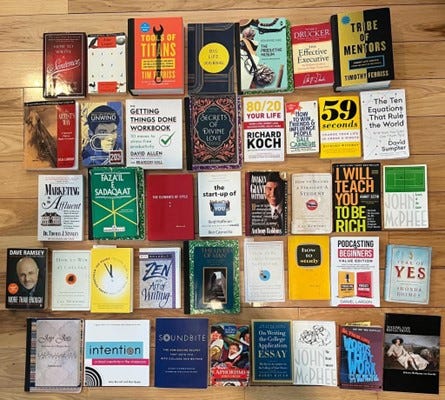
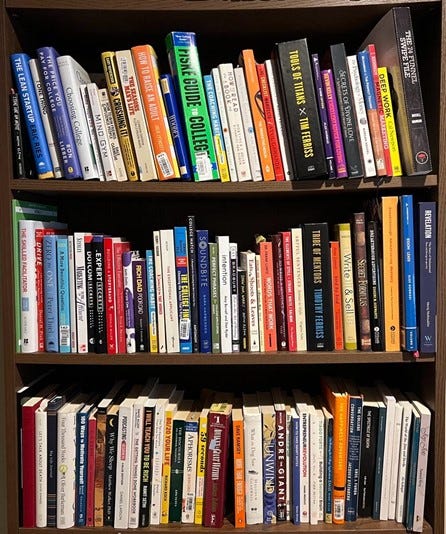

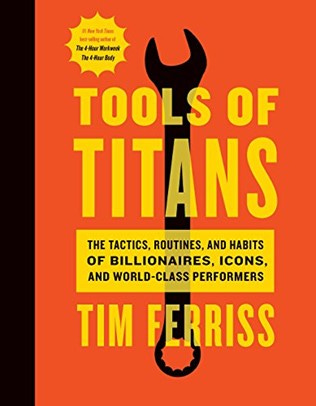

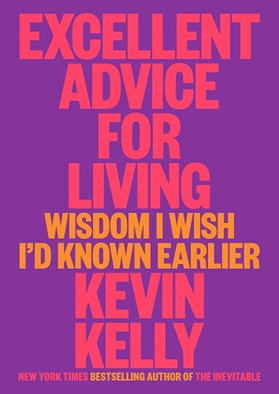
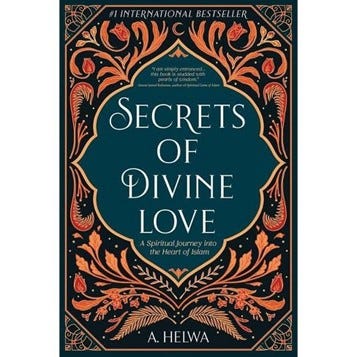
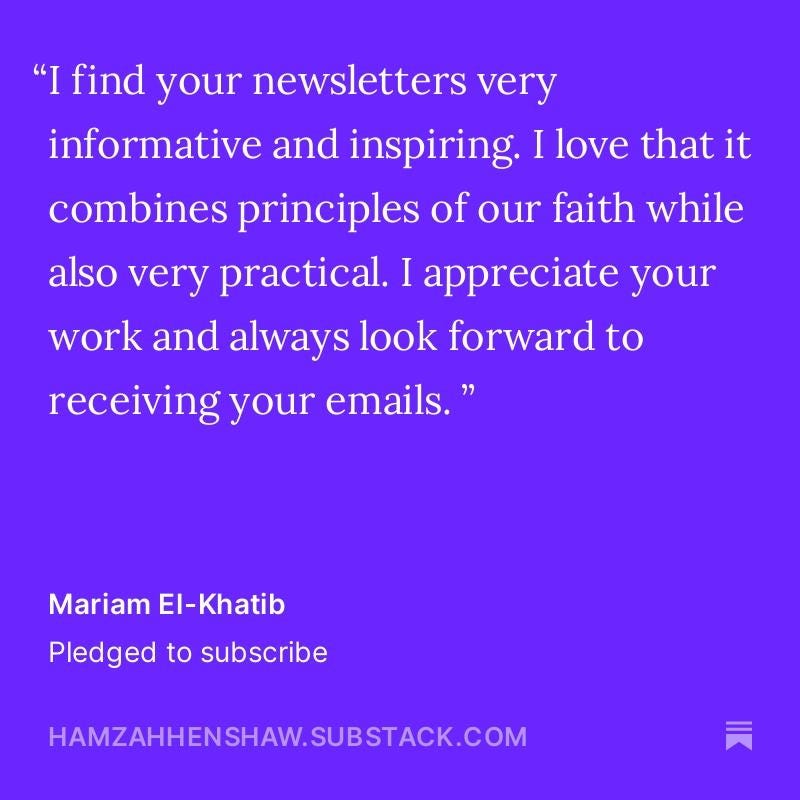
I haven't read any of the books you recommended (yet :)), except for a few pages of Secrets of the Divine. I, too, used to be a one book reader, but now have them in several places. Some of the gems I have read or am reading right now are: Rebecca by Daphne du Maurier, Against the Loveless World by Susan Abulhawa, and The Collapse of Parenting by Dr. Leonard Sax. The first is a timeless classic, which if you haven't read it, is a must. Susan Abulhawa is a Palestinian author of many award winning novels including Mornings in Jenin, and gives a tragic, yet poignant look at life in occupied Palestine, Dr. Sax's books have been excellent advisers to me raising two kids and I feel should be on every parent's bookshelf. Would love to hear other recommendations from your readers!